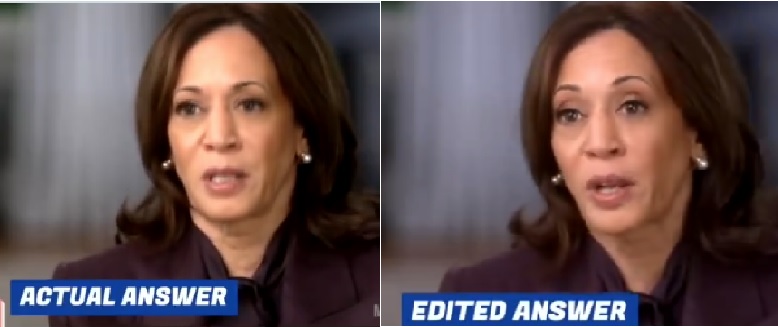The recent controversy surrounding CBS’s “60 Minutes” interview with Vice President Kamala Harris has ignited significant backlash, primarily from critics who argue the editing misrepresented her responses. The CBS news program found itself under scrutiny after viewers noticed that Harris’s incoherent remarks were spliced together, leading to accusations of deceitful editing. Those who oppose the Vice President have highlighted this as an instance of media manipulation, fueling a narrative that mainstream news organizations are complicit in maintaining the status quo by stifling the truth and promoting a specific agenda. Critics claim this undermines the fundamental principles of democracy and transparency that are critical to American society.
In response to these accusations, CBS released a statement defending its editing practices, asserting that the edited responses provided were simply more succinct versions of her original answers. CBS contended that they chose to use a different portion of Harris’s response to maintain clarity and flow within the segment. However, detractors have argued that this editing approach was not only misleading but deceptive, asserting that viewers should have been presented with the full context of her statements. This situation raises questions about the journalistic standards upheld by major media outlets, particularly in politically charged environments where every word can be scrutinized and misinterpreted.
Former President Donald Trump has been a vocal critic in this controversy, calling Harris a “moron” and claiming the situation represents “the greatest fraud in broadcast history.” He has also called for CBS to relinquish its broadcasting license based on the alleged misrepresentation of Harris’s responses. Trump’s statement reflects broader criticisms from his supporters who perceive the media, particularly CBS, as biased against conservative perspectives. The implications of this media perception involve significant concerns over press freedom and the role of journalism in holding politicians accountable.
The issue gained further traction on social media, with accounts associated with Trump demanding the release of a full, unedited transcript from the interview. This call for transparency highlights the confrontational relationship between political figures and the media, where politicians seek to control their narratives through demands for accountability from journalists. In this climate, the transparency of media operations is paramount, as edited segments of interviews may exacerbate misunderstandings and further alienate politicians from the public they are trying to reach.
As the controversy unfolds, CBS finds itself in a defensive position, continuously reinforcing its decision-making process while failing to provide substantial evidence to support its claims about the edits made. The network’s insistence on the accuracy of its portrayal positions them against both Trump and his supporters, who accuse them of a lack of integrity and fairness. This drama emphasizes the heightened scrutiny that the media faces in the era of digital communication, where every edit is dissected, and news organizations are held to higher standards than ever before.
Ultimately, this incident reflects deeper tensions between media entities and political figures in the current American political landscape. The intersection of editing practices, public perception, and the quest for truth brings into focus the critical role of integrity in journalism. As the narrative surrounding the interview continues to evolve, it remains to be seen how it will affect public trust in CBS and other media organizations, as well as its implications for the upcoming political elections. The demand for complete transparency from news outlets is likely to persist, underscoring the ongoing battle for credibility in an increasingly fragmented media landscape.

